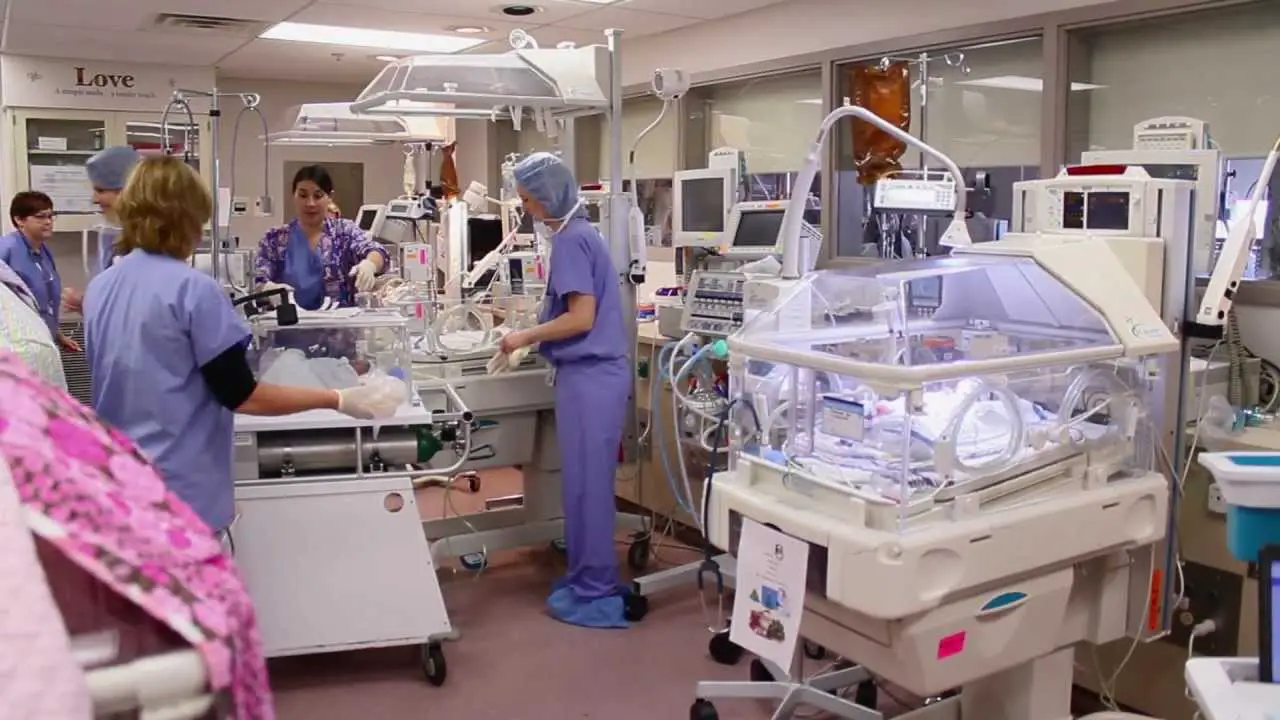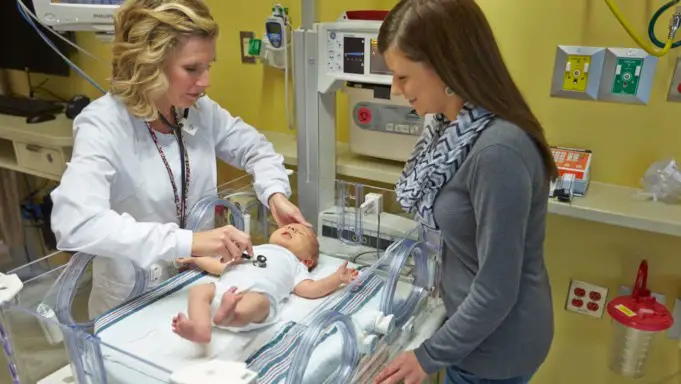A neonatal intensive care unit (NICU) is known as a hospital intensive care unit, which specializes in caring for premature babies as well as sick newborns. NICUs constitute of specialist doctors, nurses, other medical professionals, and equipment to look after premature or sick babies.
When infants don’t require the professional care and equipment of the NICU anymore, they are moved to the special care nursery.
The way neonatal intensive care unit (NICU) is structured
It can be overwhelming when visiting the neonatal intensive care unit (NICU) for the first time. After entering the NICU, the first item you notice is a series of antibacterial hand gel dispensers at the entrance.
You will need to clean your hands with sterilising soap for some minutes before going inside the hall. Infants in NICUs can easily get infected, and adequate hand-washing minimizes the chance of this happening.
The NICU may have calm moments when the lights are darkened, allowing babies to have more comfortable rest in the NICU. Most infants will possess either an active open cot or a concealed incubator. This helps keep their bodies at the proper temperature.
Depending on the medical aid that babies require, there may be:
- Ventilators to assist them with breathing
- Devices to provide measured quantities of fluids and medications to the babies via tubes going into their veins
- Monitors connected to the babies with cables to compute heart rate, breathing, and the percentage of oxygen in their blood
- Unique cooling beds to aid in reducing brain damage in infants who have had a complicated birth
This technology ensures that babies are comfortable, with little extra treatment as possible. It regulates them and allows medical personnel to know when the babies need additional care.
Other large devices are carried into the NICU when they’re required. This may include machines that are used for:
- Taking X-rays and ultrasounds
- Monitoring brain function
- Giving babies phototherapy, or treatment under lights, for jaundice
The NICU is generally a cool area, with nurses and doctors quietly taking care of the babies. The monitors in this area are programmed to alert the personnel if a baby’s breathing or heart rate is out of the average.
Neonatal intensive care unit (NICU) personnel
Professional nurses
Each newborn in a neonatal intensive care unit (NICU) has a personal bedside nurse. This nurse is highly trained, having done extra researches in nursing babies, in addition to the nursing degree. Your baby’s nurse can tell you things you need to know about your baby’s medical condition.
The nurse will know about the current test results, changes in how your baby is being cared for, and your baby’s condition over the last few hours. There are also supervisors of NICU sections and always one nurse who oversees the entire NICU.
Neonatologists
NICUs have doctors known as neonatologists who are experts in newborn care, which is also referred to as neonatal care. These doctors are initially trained as paediatricians, and further their training as neonatologists.
Most NICUs have numerous neonatologists, and one of them will be overseeing the whole NICU. There is usually a neonatologist on duty, and you can ask to talk to this person.
Visiting staff
Laboratory, echocardiogram, and X-ray technicians visit the NICU on a regular basis. Other paediatric experts such as cardiologists, ophthalmologists, neurologists, or surgeons may also attend to some babies.
NICUs also have additional health specialists to assist both parents and babies. They include occupational therapists, physiotherapists, psychologists, speech pathologists, psychiatrists, social workers, and pastoral care workers.
This personnel can discuss with you and aid you with few challenges of having a baby in the NICU. These challenges may include family complications, worry, and anxiety, or questions about your baby’s development. NICU staff always organise information sessions for parents such as baby massage and social get-togethers.
Baby’s care in the neonatal intensive care unit (NICU)

NICUs in Australia make use of a nursing program called Developmental Care, or Newborn Individualized Developmental Care and Assessment Program (NIDCAP). Developmental Care is a means of caring for premature or sick babies in the hospital, which concentrates on your baby’s and family’s wants.
This program is all about lessening your baby’s stress during day-to-day medical care. It’s also about ensuring your baby’s sleep. This implies that the nurses will oversee your baby and use all their observations to get a detailed picture of how your baby responds and copes with the situation.
The nurses will also determine how and when they care for your baby. They may look after your baby for some minutes and decide whether to wake him/her up or let them rest a little longer.
The nurses may also:
- Do cluster care, which indicates bathing and feeding your baby in a single span
- Plan care and feeding so that they don’t need to wake your baby from a deep sleep
- Perform occasional vital signs reviews if your baby doesn’t want them
- Reduce stimulation during feeding by nourishing your baby in a calm, safeguarded corner, or feeding without speaking and staring at the baby
- Allow your baby suck something during and after feeding, or you can give your baby items to hold when he or she is being handled
- Cover your baby’s eyes so that being on the treatment table is less tiring for the baby
- Prevent patting, swirling, and conversing with your baby all at once to evade overstimulation
Immediately after caring, the nurse will observe your baby again to know how the procedure influenced him or her and whether the baby wants additional assistance to resettle.
They’ll also alter the setting to ensure that your baby is safe. This may suggest that making sure their bed isn’t close to noisy taps or sinks, cutting out telephone & radio noise, or utilizing a gel, water, and ripple mattress.
Hospitals ensure to make a neonatal intensive care unit (NICU) family-friendly. Several hospitals will accomplish things a little differently. However, the hospital you choose will have the policy to ensure that your family is taken care of while your baby is in the NICU.
You can also inquire for a copy of the hospital’s policy if necessary.
Reference
- The neonatal intensive care unit (NICU): what to expect–Raisingchildren












